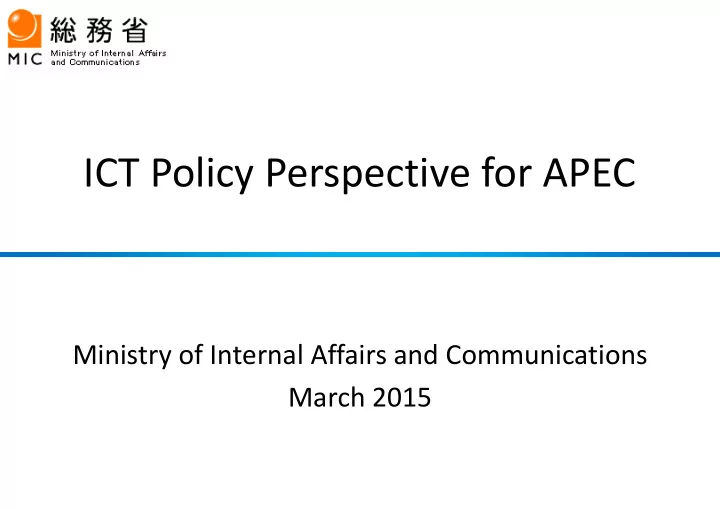

ICT Policy Perspective for APEC Ministry of Internal Affairs and Communications March 2015
Current Status in APEC Region 1 ● GDP Growth Rate ● Share of Global Communications Service Contract Twice the global average Over 50% of global mobile phone subscription Mobile phone subscription Asia・ Rest of Pacific the world 52% 48% 《Asia・Pacific》 World Asia・Pacific A high ICT potential 4.4% 8.5% ● ICT Investment Growth 44% of global broadband rate subscription 1.3 times the global average Broadband subscription rate Asia ・ Pacific Rest of the world 44% 56% World Asia・Pacific ※ Asia Pacific countries are APT 5.4% 7.2% member states
Issues for APEC Region 2 (1) Deployment of ICT infrastructure, resolving digital divide Actions for areas with poor ICT infrastructure (2) Cooperation and coordination in ICT policies among the countries Cooperation in ICT policies and harmonization of legal system among the countries (3)Cooperation of ICT policies with other policy area Promoting cooperation with other policy areas(energy, logistics, medical care, etc.) (4)Return of the benefits of ICT technical innovation Utilization of new technology and services such as IoT, Cloud, SNS, AI and robotics (5)Resolving global issues with ICT Utilizing ICT for solving global issues, such as disaster prevention, global warming, energy and health care.
Basic Viewpoints for Solving the Issues 3 (1) Win-Win relationship between each country and APEC region Promote policies to establish a win-win relationship that will bring prosperity to each country as well as the whole APEC region (2)Creation of added-values through information Socio-economic system has been comprised of people, goods and money thus far. By connecting them through ICT, new values are created. Up to present In the future (3)Free flow of information Establish free flow of information, not only within each country but within the entire APEC region.
Proposals I 4 (1) Strengthening ‘connectivity in cyber space’ (establishing CPI connectivity) Enhance connectivity in ‘Cyber Space’ , ‘Physical Space’ and ‘Institutional Space’ beyond national boundaries. Connectivity in Cyber space (C) Connectivity of information in cyber space where person to person, person to goods, and goods to goods Connectivity in are all connected anywhere, any Institutional space (I) time. Connectivity of legal systems that form social infrastructure Connectivity in Physical space (P) Connectivity of real movements of people, good and money.
Initiatives for Connectivity in Cyber Space I 5 (I) Promote application-to-application connectivity -Promote linkage of various applications, such as ’disaster prevention ICT’, ‘e-government’ , e-health’ and ‘e-education’ as needed. -Promote linkage of applications within a country, as well as linkage of particular applications across countries within the region Various applications operate in tandem, according to the Various applications needs. (disaster prevention system, e- government, e-Health, ITS, etc.) Various platforms are also linked to facilitate the Various platforms linkage of (geospatial information, ID information, applications Big Data, Open Data, etc.)
Initiatives for Cyber Connectivity in Cyber Space II 6 (II) Reduction of mobile roaming rates within APEC economies. -Sharing the idea for the appropriate level of IOT in APEC economies. (III) Promote the exchange of broadcast programs within the region. -Promote mutual exchange of broadcast programs and joint production across the border. (IV) Promote Open Data within the region -Develop actions for Open Data in each country and roll it out across APEC. (exploring of the common format for data, etc.)
Proposals II 7 (2) Internet governance by multi-stakeholders Confirm the importance of ‘multi-stakeholder process’ in internet governance where governments, industries, academia, communities, etc. participate. (3) Regional coordination regarding information security and privacy Develop common understandings within the region on measures against an ever-increasing threat of cyber attacks, as well as measures for protecting privacy
8 Thank you! Ministry of Internal Affairs and Communications, JAPAN
Recommend
More recommend